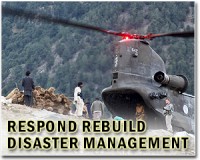 |
Port-Au-Prince (AFP) May 27, 2011 A draft report has cast huge doubt on the death toll in last year's Haiti earthquake and the numbers left homeless, and raises questions about US aid for rebuilding the Caribbean nation. The report claims that far fewer people died in the devastating 2010 quake than thought and many of those still living in squalid tent cities did not lose their homes in the disaster. The independent report has yet to be released, but is based on a survey commissioned by the US Agency for International Development (USAID) and draws its estimates from door-to-door surveys carried out over 29 days in January. "The number of fatalities that resulted from the earthquake is estimated at 46,190 to 84,961, approximately 2.2% of the population," says the draft report. That figure is far below the commonly accepted toll of some 250,000 dead. The report -- dated May 13 and obtained by AFP -- also questions official UN figures that around 680,000 people remain homeless, contending that only between 5% and 10% of that number moved into the street from crumbled homes. "Findings in this report as well as findings of the MTPTC (ministry of public works) color-coded building program suggest this as well as most of the other estimates cited are improbable figures," it says. A spokesman for the State Department, which oversees USAID, acknowledged it had commissioned the report from Washington-based firm LTL Strategies. "The first draft of the report contained internal inconsistencies with its own findings," spokesman Mark Toner told AFP. "We are reviewing these inconsistencies with LTL Strategies to ensure information we release is accurate." Entitled "Building Assessments and Rubble Removal in Quake-Affected Neighborhoods in Haiti," the report could have major implications for the future of aid and reconstruction to the impoverished nation. The United States, along with other international donors, has pumped millions of dollars into Haiti in a bid to help it get back on its feet after the quake leveled much of the capital, Port-au-Prince. For many impoverished Haitians the huge, sudden influx of international aid was a golden opportunity to improve their lives, even if they had not lost their homes. In the months after the disaster, the USAID's Foreign Disaster Assistance funded a multi-million project to assess the safety of nearly every earthquake-damaged home in Haiti. The project led by the Pan American Development Foundation, and working with the well-known structural engineering firm, Miyamoto International and Haiti's ministry of public works (MTPTC), moved across the island, labeling totally unsafe homes as "red" and mostly unsafe homes as "yellow." Then in January, more than 2,000 in-depth surveys were conducted in a follow-up study commissioned by USAID across poor, low income neighborhoods in Port-au-Prince. Two teams went house-to-house, revisiting homes labeled in the initial assessment program, and asked respondents more than 100 questions, such as "How long did you stay in a camp?" and "Why did you leave the camp?" Most notably, residents were asked, "How many people died in the quake who lived in this building?" making it the first such survey carried out in Haiti. The surveys found that 64 percent of red houses and more than 90 percent of yellow homes were already reoccupied. There was no comment Friday from the office of President Michel Martelly, But a government spokesman, who asked not to be named, expressed surprise, saying: "Honestly, I have never heard of these figures. "The official figures remain the same. It's surprising that we would talk about new figures now." The study's authors are listed on the front page as Timothy Schwartz with contributors Yves-Francois Pierre and Eric Calpas. The issue of the homeless was brought to the fore this week when Wilson Jeudy, the mayor of Delmas, a large district of Port-au-Prince, evicted residents from two camps in public spaces. Jeudy could not be reached for comment, but told Le Nouvelliste daily he was concerned the camps had become havens for criminals. And he said he offered no compensation or housing alternatives, as he did not support paying people to move. "If you give money to these people, they will relocate to other camps to wait again," he said.
Share This Article With Planet Earth
Related Links Bringing Order To A World Of Disasters A world of storm and tempest When the Earth Quakes
 Anguished hunt for scores missing after US tornado
Anguished hunt for scores missing after US tornadoJoplin, Missouri (AFP) May 25, 2011 Rescue teams and anguished families Wednesday were desperately searching for nearly 1,500 people listed as missing since a tornado ripped through a Missouri town, killing at least 125 residents. But hopes of finding more survivors were fading as the third day of painstaking searches through the devastated homes of Joplin found no one in the rubble - neither dead or alive. "We're disappo ... read more |
|
| The content herein, unless otherwise known to be public domain, are Copyright 1995-2010 - SpaceDaily. AFP and UPI Wire Stories are copyright Agence France-Presse and United Press International. ESA Portal Reports are copyright European Space Agency. All NASA sourced material is public domain. Additional copyrights may apply in whole or part to other bona fide parties. Advertising does not imply endorsement,agreement or approval of any opinions, statements or information provided by SpaceDaily on any Web page published or hosted by SpaceDaily. Privacy Statement |